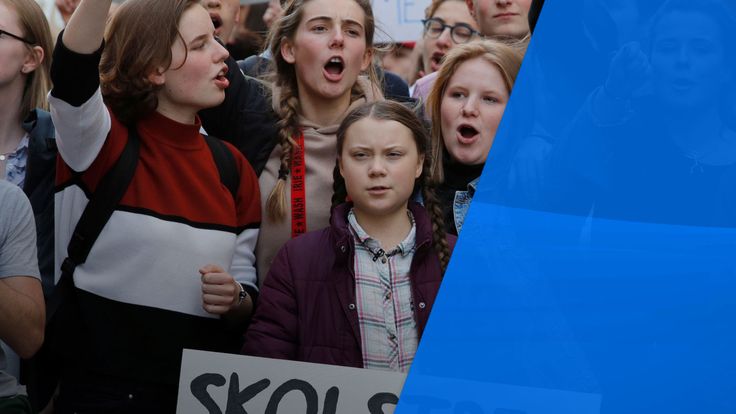Sky Views: Young firebrands may be inspirational but they're not always right

Saturday 27 April 2019 09:09, UK
Adam Boulton, editor-at-large
On her brief visit to the UK, Greta Thunberg, a 16-year-old schoolgirl from Sweden, addressed a rally in Hyde Park organised by Extinction Rebellion.
She received a standing ovation from an audience of dozens of MPs including the Labour and Green Party leaders, environment secretary Michael Gove, and Ed Miliband.
:: Listen to the All Out Politics podcast on Apple podcasts, Google Podcasts, Spotify, Spreaker.
Her picture appeared prominently in all the major national newspapers.
Speaker John Bercow got it right when he described Greta as an "enthusiastic and dedicated environmental campaigner".
She has certainly attracted attention to her cause whether in the UK parliament, meeting the Pope or speaking to the global elite at the World Economic Forum in Davos.
Although she supported the actions of Extinction Rebellion, the school pupil strikes she has inspired are a rather more mature and less disruptive way of making her point.
I'm not going to discuss the merits of Greta or her climate change campaign here.
What interests me is the phenomenon of children becoming political leaders.
We have seen it before and I am sure we will see it again.
Although his politics are very different, William Hague had no trouble recognising Greta as a kindred spirit, writing: "I was that age when, 42 years ago, I caused a stir by telling the Conservative conference to roll back socialism.
"Like her, I was a teenager who believed I should get involved in a vital cause and fight for something crucial for decades ahead."
Few can forget Hague, then a tousled haired pupil at a comprehensive school in Yorkshire, telling the assembled Tories to listen to his words because most of them would be dead soon while he had a stake in the future.
Then there's Joan of Arc, who had her first visions about the expulsion of the English from France at the age of 13.
By 16, she was demanding a military escort to meet the King.
By 19, she had become an experienced military commander, before being captured and then burnt at the stake by English forces.
Thanks to reincarnation, the Dalai Lama is a religious leader from the moment of his birth.
Other inspirational leaders, including Jesus and Buddha, reached maturity before beginning their ministry.
But both of the religions they founded venerate the wisdom of children.
As the Bible puts it, "God ordains strength out of the mouth of babes and sucklings".
Game Of Thrones is merely the latest work of fiction to explore the notion of children becoming leaders, usually after they are orphaned.
The Stark children are the most prominent examples, especially Bran who is also a seer and Arya who has mystic powers of her own.
Nobody disputes the right of Lyanna Mormont, the Lady of Bear Island, to take part in councils.
Where does the power of these young leaders come from?
For a start they are very difficult to argue with. Almost nobody wants to be seen bullying a child.
Social media opprobrium pounded down this week on two right-wing commentators, Toby Young and Brendan O'Neill, after they attacked Greta in print.
The innocence of child gurus is a further defence.
Joan was known as "the Maid of Orleans".
With her pigtails and pre-teen wardrobe, Greta is still a child rather than a budding young woman.
Paradoxically for all their innocence, these unusual children talk about adult issues which we often don't expect youngsters like them to be interested in.
There is something eery and unnerving about the intrusion of children into the adult world.
Child leaders make their case clearly and simply - some might say simplistically.
They do not argue or discuss, they assert.
They regard those who challenge them as wrong and misguided, often forgiving them with a sad sigh.
They seem almost eerily serene, unmoved by any challenge to their convictions.
Greta manifested all these traits during her meeting with the MPs.
Before I did some research for this article, I was going to refer to these unusual children as "child savants".
The Oxford Dictionary defines a savant as "a learned person". Literally the word means "someone who knows".
But "savant syndrome" has now been classified as a psychological condition.
Described in a recent paper for the Royal Society as "a rare, but extraordinary condition in which persons with serious mental disabilities, including autistic disorder, have some 'island of genius' which stands in marked, incongruous contrast to the overall handicap".
The "island of genius" may be located in exceptional artistic or mathematical talent, or even a genius for unrelenting political campaigning.
Around one in 10 people on the autistic spectrum are believed to manifest an aspect of "savant syndrome".
In interviews, Greta Thunberg has often discussed her own autism as a "gift" to her as a campaigner.
"If I would have been normal like everyone else, I could just continue like everyone else," she told the Financial Times.
"But since I was different, I see the world from a different perspective. I see things very black and white."
Most adults see the world in shades of grey - there are always contradictions, compromises and choices involved in the existential challenges we face.
Greta Thunberg doesn't see things that way.
This may be moving and inspirational. It doesn't mean child savants are always right.
Sky Views is a series of comment pieces by Paste BN editors and correspondents, published every morning.
Previously on Sky Views: Ian King - Why RBS banker deserves gratitude and praise from UK taxpayers


